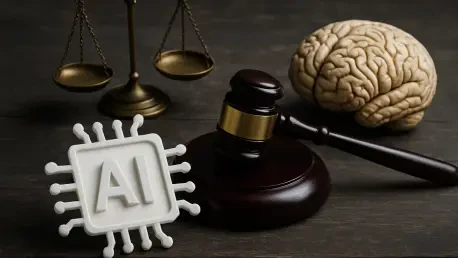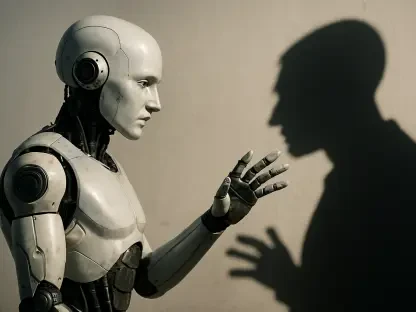Introduction to AI and Ethical Concerns
Imagine a world where machines not only perform tasks but also shape thoughts, influence emotions, and even challenge spiritual beliefs—a scenario that is no longer science fiction but a pressing reality with the rise of Artificial Intelligence (AI). This transformative technology is redefining industries, economies, and social dynamics at an unprecedented pace, raising profound questions about its impact on humanity. The ethical dilemmas surrounding AI are vast, touching on everything from intellectual dependency to the erosion of personal connections.
This review delves into the multifaceted ethical challenges posed by AI, exploring how it affects human intellect, relationships, and even spirituality. By examining these dimensions, the aim is to provide a comprehensive understanding of AI’s current implications and potential future considerations. A balanced perspective will guide this analysis, ensuring that both the promises and perils of AI are thoroughly assessed.
The significance of addressing these concerns cannot be overstated, as AI continues to integrate into daily life. From healthcare to education, its presence is inescapable, making it imperative to establish moral frameworks that can steer its development responsibly. This exploration sets the stage for a deeper dive into the ethical landscape of AI.
Understanding AI’s Core Principles and Context
At its core, AI operates through sophisticated mechanisms like machine learning, data processing, and automation, enabling systems to mimic human-like decision-making and problem-solving. Machine learning algorithms, for instance, analyze vast datasets to identify patterns and make predictions, while automation streamlines repetitive tasks across various sectors. These foundational elements allow AI to adapt and improve over time, often surpassing human capabilities in specific domains.
The rapid evolution of AI has led to its seamless integration into everyday life, from virtual assistants on smartphones to recommendation systems on streaming platforms. Its pervasive presence shapes societal norms, influencing how individuals interact with technology and each other. This widespread adoption underscores AI’s relevance in modern ethical discussions, as it increasingly dictates the pace of cultural and economic shifts.
Beyond convenience, AI’s role in transforming industries highlights the urgency of addressing its ethical implications. As tools become more advanced, their potential to impact decision-making and personal autonomy grows, necessitating a critical examination of their societal footprint. This context forms the backdrop for understanding the ethical dimensions that follow.
Key Ethical Dimensions of AI
Impact on Human Intellect
One of the most pressing concerns with AI is its potential to undermine critical thinking skills. As individuals increasingly depend on AI tools for decision-making and problem-solving, there is a risk of intellectual erosion, where personal cognitive effort diminishes. This over-reliance could lead to a society less equipped to tackle complex challenges independently.
Expert opinions emphasize the importance of preserving cognitive abilities amidst technological convenience. For instance, industry leaders have warned that substituting human judgment with AI-driven solutions might dull analytical skills over time. This perspective highlights a delicate balance between leveraging AI for efficiency and maintaining the sharpness of human intellect.
The long-term consequences of such dependency remain a topic of intense debate. If unchecked, the trend could reshape educational systems and workplace dynamics, prioritizing automation over critical thought. Addressing this issue requires intentional efforts to ensure technology serves as a tool for enhancement rather than replacement of mental faculties.
Disruption of Human Relationships
AI also poses a significant risk to genuine human connections by fostering artificial intimacy. As chatbots and virtual companions become more sophisticated, there is a danger that individuals might prioritize these interactions over real interpersonal bonds, which are vital for emotional well-being. This shift could lead to a profound sense of isolation despite digital engagement.
Specific examples, such as AI-driven conversational agents, illustrate the need for safeguards to prevent emotional attachment to technology. Without clear boundaries, users may develop unhealthy dependencies on these tools, mistaking programmed responses for authentic care. This underscores the importance of designing AI with limitations that discourage such misplaced affection.
The broader societal impact of disrupted relationships could be far-reaching, affecting mental health and community cohesion. As technology advances, ensuring that it complements rather than competes with human interaction becomes essential. This challenge demands innovative approaches to maintain the integrity of emotional connections in a digital age.
Spiritual and Moral Implications
Less conventional but equally significant are the spiritual concerns surrounding AI, particularly its potential association with practices deemed ethically questionable. Some perspectives suggest that AI’s data-driven predictions could mirror occult divination, while concepts like digital necromancy—attempting to simulate communication with the deceased—raise alarms about spiritual corruption. These ideas push the boundaries of traditional ethical discourse.
Such concerns call into question the alignment of AI with spiritual integrity, prompting discussions about the role of moral authorities in mitigating risks. Traditional institutions, with their deep-rooted teachings on human dignity, are seen as critical in addressing these unconventional threats. Their guidance could help navigate the intersection of technology and spirituality.
The implications extend to how society perceives morality in the face of advancing technology. As AI tools become more ingrained, ensuring they do not encroach on sacred values or ethical principles is paramount. This dimension of AI ethics, though less explored, demands attention to safeguard holistic human well-being.
Recent Developments in AI Ethics
In recent times, the conversation around AI ethics has gained momentum, with religious and academic institutions actively shaping guidelines. Various conferences and panels have brought together experts to discuss the moral implications of AI, advocating for frameworks that prioritize human dignity. These discussions reflect a growing consensus on the need for structured oversight.
Emerging trends point toward a push for ethical AI design, with an emphasis on transparency and accountability. Public awareness of AI’s societal impact has also surged, fueled by media coverage and educational initiatives that highlight both benefits and risks. This heightened consciousness is driving demand for policies that address ethical concerns head-on.
Collaborative efforts between technologists and ethicists are paving the way for innovative solutions. From integrating moral considerations into AI development to establishing global dialogues, these initiatives aim to create a balanced approach. The trajectory of these developments suggests a future where ethical AI is not just an aspiration but a practical reality.
Real-World Applications and Ethical Concerns
AI’s deployment across sectors like healthcare, education, and customer service showcases its transformative potential, yet it also reveals distinct ethical dilemmas. In healthcare, for example, AI-driven diagnostics improve accuracy but raise questions about patient privacy and the dehumanization of care. These applications highlight the dual nature of technological progress.
In education, AI tools personalize learning experiences, yet they risk widening inequality if access remains uneven. Similarly, customer service chatbots enhance efficiency but can erode trust if users feel manipulated by automated responses. Each sector presents unique challenges that require tailored ethical considerations to ensure fairness and integrity.
A notable case involves Catholic-oriented AI tools like Magisterium AI, designed to assist with theological queries. While innovative, its implementation sparks concerns about over-reliance on technology for spiritual guidance and the potential for misinterpretation of doctrine. Such examples underscore the need for careful design and oversight in niche applications of AI.
Challenges and Limitations in AI Ethics
Despite growing awareness, AI ethics faces significant hurdles, including the absence of universal standards to govern its use. Without a cohesive global framework, disparities in regulation and enforcement persist, allowing ethical breaches to slip through the cracks. This gap poses a substantial barrier to responsible AI development.
Algorithmic bias remains another critical challenge, as AI systems often reflect the prejudices embedded in their training data. Coupled with regulatory shortcomings, these biases can perpetuate systemic inequities, undermining trust in technology. Addressing this requires rigorous scrutiny of data sources and continuous updates to ethical guidelines.
Efforts to mitigate these issues are underway, with advocacy for strict guardrails gaining traction. Institutions like the Catholic Church play a pivotal role in shaping moral oversight, drawing on historical teachings to inform modern policies. Their involvement, alongside secular initiatives, offers hope for bridging gaps in AI ethics through collaborative action.
Future Outlook for AI and Ethical Guidance
Looking ahead, the trajectory of AI ethics points toward the development of stronger moral frameworks that can adapt to technological advancements. Global collaboration on guidelines is expected to intensify over the next few years, fostering a unified approach to address ethical concerns. This collective effort could redefine how AI integrates into society.
The long-term impact of AI on human identity, relationships, and spirituality remains a focal point of speculation. As systems grow more autonomous, their influence on personal autonomy and cultural values could deepen, necessitating proactive engagement from ethicists and policymakers. Anticipating these shifts is crucial for mitigating unintended consequences.
Technological innovation must be matched by ethical vigilance to ensure AI serves humanity’s best interests. The coming years will likely see an emphasis on education and dialogue to prepare societies for these changes. By prioritizing ethical guidance, there is potential to harness AI’s benefits while safeguarding core human principles.
Conclusion and Key Takeaways
Reflecting on the discussions held, it becomes evident that AI poses critical ethical challenges across intellectual, emotional, and spiritual domains. The analysis revealed a landscape fraught with risks, from diminished critical thinking to disrupted human bonds and unconventional moral threats. These insights underscore the complexity of integrating AI into daily life.
A key takeaway is the urgent need for robust guidelines to navigate this terrain, a realization that echoes through various expert contributions. The consensus leans heavily on the importance of moral authorities in shaping AI’s path, ensuring it aligns with human dignity. Their influence proves vital in past deliberations on technology’s role.
Moving forward, actionable steps emerge as a priority, including fostering interdisciplinary partnerships to craft ethical standards. Encouraging public discourse on AI’s societal role and investing in education to build awareness are also seen as essential. These measures promise to guide AI development toward a future that balances innovation with humanity’s core values.









